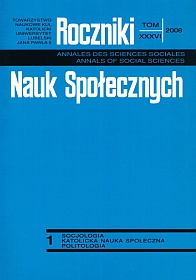Politics, Democracy and European Integration in the View of Young Poles
Abstract
The paper seeks to analyse what Polish young people think about the essential categories of modernity: politics, democracy, and European integration. The author refers to the findings of numerous sociological, Polish and European, studies on the view held by young people in the period that preceded Poland’s accession to the European Union. While analysing politics, it has been highlighted what they think about politicians, political parties, and electoral campaigns. The vast majority of young people could not declare their political views. This may be accounted for by the fact that the youth were not interested in politics then, and their attitude towards politics was negative. They appreciated private, personal values, and family life rather than participation in social life. In the group of students from vocational schools one could observe the highest level of political frustration and noncommitment in politics. Now if we compare Polish young people and adults, we can observe an analogous relation towards democracy. The pro-democratic attitudes among young people were whaped the kind of school they attended, their social status, and living standards. At the turn of the centuries, there was a decisive increase in critical views towards democracy in Poland. With regard to Poland’s mombership in the European Union, the picture varied in relation to political preferences. The degree of support and commitment of behalf of the process of European integration changed according to the degree of the so-called European mobility. The largest support was manifested by the individuals of pro-European orientation, pragmatic, open to new experiences, culturally and religiously tolerant, oriented to the future, active, and with a high level of curiosity. Despite the constant high support for integration among young people, they also noticed its negative aspects. Together with the information campaign on the EU and extended awareness, qoung people were afraid of some negative consequences of our accession. Nevertheless, the decisive majority of the youth manifested a positive reaction to Poland’s membership in the EU.
Copyright (c) 2008 Roczniki Nauk Społecznych

This work is licensed under a Creative Commons Attribution-NonCommercial-NoDerivatives 4.0 International License.


